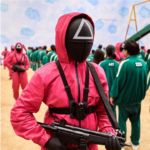Squid Game

Squid Game is a nine-episode Korean TV series on Netflix (with a sequel coming soon). The original is, historically, the most successful series ever to appear on the streaming platform.
The protagonist is Seong Gi-hun (Lee Jung-jae), a laid off worker whose factory closed. He foolishly gambles to make the money he cannot earn. Gi-hun sinks deeply in debt, loses his wife to a more affluent suitor, and struggles to connect with his daughter. His mother has barely enough to eat, and he feels powerless to help her. Gambling is now his addiction.
Desperate poverty is at the heart of it all. Here in the US millions of middle-class Americans are just one missed paycheck away from homelessness, with 4 of 10 without enough savings to cope with simple things gone wrong: a car repair, a broken refrigerator, a plumbing emergency.
Gambling is a monster that feeds on the poor and vulnerable. The largest numbers of gamblers come from the poorest sectors of the population. The vice leads to a betting addiction which destroys marriages, families, and lives.


In the series, Gi-hun is enticed into the Squid Game. The playing field is located in an isolated prison-like facility. The contestants play familiar Korean childhood games. The final prize is 45.6 billion won, or approximately $38 million. The winner becomes immensely wealthy; all the losers die. It’s a zero-sum game.
The desperation of poverty and powerlessness is made explicit in Squid Game. Unlike Hunger Games, another single survivor game, there is no fantasy world removed from reality. Viewers can’t pretend that Gi-hun’s despair is in an imaginary world.
Gi-hun’s violent creditors close in. They threaten to carve up his body for transplant parts. A chance encounter with a stranger offers hope. He is lured into a game of ddakji, an envelope-flipping betting contest. The next step is the Squid Game. Even when he knows what will happen in the game, it offers more hope and possibility than the dire life he is currently leading.
The other contestants are just as poor and desperate. The causes of modern income inequality might be complex and the solutions multi-faceted, but at the end of the day, there are some people who have more than enough, and Gi-hun and his doomed co-players have nothing. “Poverty exists not because we cannot feed the poor, but because we cannot satisfy the rich.”




Create a visual map for a character’s emotional journey. Pull stories from character rather from rote story structure beats. Some of the largest international media companies, use this in story and character development.


A clear concise guide for writers and producers to have by their side as they embark on a project. It gives a really vital reminder of what is key for story success.

No comment yet, add your voice below!